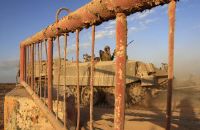 |
| An Israeli armored vehicle enters the Philadelphi corridor near the Palestinian town of Rafah in the southern Gaza Strip on Thursday. The Intelligence and Terrorism Center in Israel reports that anti-tank rocket fire in the Gaza Strip has increased recently. Photo by Tsafrir Abayov/Associated Press. |
Jerusalem – The number of anti-tank rocket fire incidents in the Gaza Strip has risen significantly of late. During the first two weeks of October, there were 11 incidents of fire, in contrast to only four in September, as revealed by the Intelligence and Terrorism Information Center located in Herzelia, Israel.
Security officials believe that the rise in rocket fire stems from the arrival of new anti-tank weapons in the Gaza Strip. An additional reason is the intensive prevention activity by the Israel Defense Force within the Gaza Strip.
The Palestinians made broad use of anti-tank fire during recent IDF operations in the Gaza Strip. During one operation which focused on the northern Gaza Strip and was meant to block Kassam rocket fire at communities in the western Negev, the IDF encountered strong anti-tank fire and bombs laid by terrorists. Hamas announced that its activists had fired anti-tank fire and mortar shells at IDF forces in the Jabalya area.
During another operation which focused in the Khan Yunis area of the Gaza Strip and was meant to uncover tunnels and capture wanted terrorists, strong exchanges of fire took place between the IDF and the Palestinians. That fire included anti-tank rocket fire, shells and bombs.
Hamas Forces Gaining Strength
At the beginning of the week a Hamas government spokesman, Aslam Shahwan, announced that the government was considering doubling the number of operational force personnel to 5,500 armed men from various factions.
Shahwan told the Jordanian newspaper Al Rai that at first the Palestinian Interior Minister had set up an operational force of 3,500 armed men out of the various Palestinian factions, but recently the number has grown. “Today we see that the force is insufficient and therefore we will have to increase it, especially in areas where there are not enough security people to main tain law and order,” announced Shahwan.
The operational force was set up by Hamas in May of this year in order to deal with the chaos reigning in the Gaza Strip and as a response to the efforts of Abu Mazen to concentrate control over the security organizations in his own hands. During violent clashes in the Gaza Strip the operational force served the Interior Ministry as the main operational arm of Hamas against Fatah and security organizations under Abu Mazen’s control.
Israeli and Palestinian sources note that the financing of the force and its arming is accomplished by smuggling cash and weapons into the Gaza Strip across the Egyptian border. This is at a time when the Palestinian Authority has no money to pay its employees, including police and security services. The force is made up mostly of activists in the operational-terrorist arm of Hamas, in addition to the operational arm of Fatah men opposed to Abu Mazen, and activists from the Popular Resistance Committees. According to a Popular Resistance Committee spokesman, about 700 of their men are in the operational force.
The operational force is under the control of Palestinian Interior Minister Said Siam. Its commander is believed to be Yousef a-Zahar, brother of Palestinian Foreign Minister Mahmoud a-Zahar. The members of the force wear blue police uniforms, which does not prevent its opponents from calling it the “black militia.” They patrol the Gaza Strip mainly in civilian jeeps. This force allows Hamas to establish the maintenance, equipping, and financing of its armed terrorists, with the argument that it is a legal force of the PA.
At this stage the force is used mainly against opponents of Hamas in the Gaza Strip. However, security officials believe that in the future the force will also be integrated into terror operations against Israel.
©The Bulletin 2006







